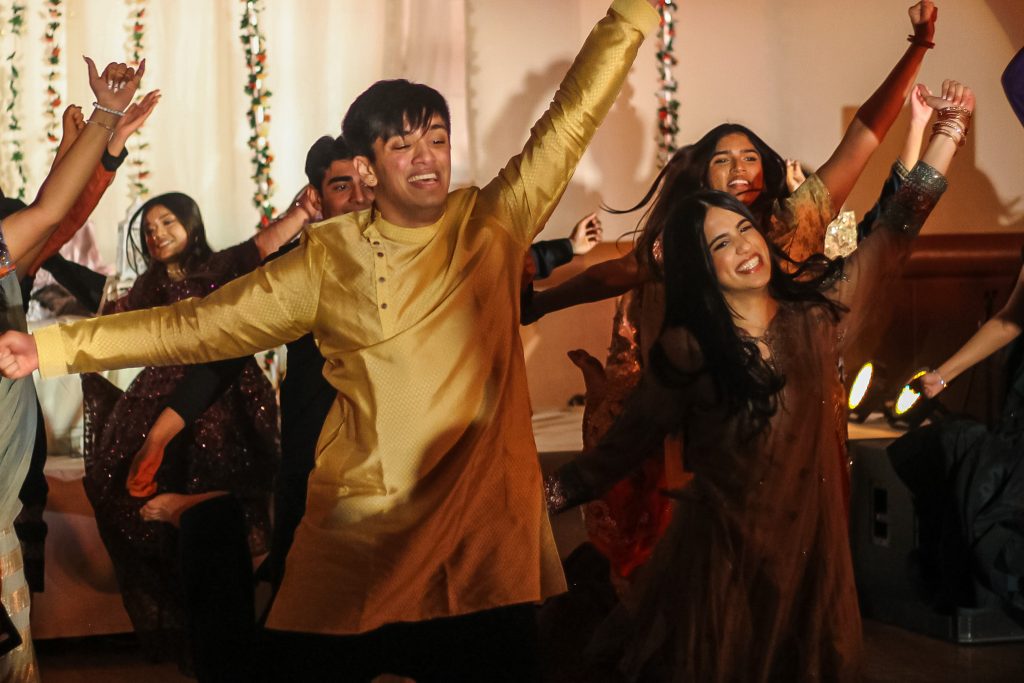Binghamton University’s Pakistani Student Association (PSA) held their own version of a Shaadi right here in the Mandela Room on Wednesday, March 1. The event was called “Mock Shaadi,” or “A Fake Wedding.”
The Mock Shaadi celebrated the “marriage” between Sejal Luthra, a senior double-majoring in psychology and business administration, and Adel Hamdi, a junior majoring in computer science — successfully giving insight into how a Shaadi would normally look in many South Asian countries.
A Shaadi refers to the traditional wedding celebration that occurs between a bride and groom in many South Asian countries. It encompasses cultural aspects of both the individuals involved, ultimately creating an event that expresses the beauty of South Asian culture. Unlike traditional American wedding celebrations, a Shaadi can last from approximately three to five days, with each day having its own unique meaning. The purpose of the lengthy celebration is to unify the families of the bride and groom, and to give them opportunities to understand and appreciate each other’s cultures and traditions.
Upon arriving at the event, almost everyone was dressed in traditional South Asian attire, which was composed of saris, kurtas, shalwars and more. The room was full of vibrance and life. Appetizers were given out at the beginning, and guests eventually took to their seats, eagerly waiting for the bride and groom. The tables were decorated with a flower bouquet, as well as a traditional Indian candle lantern, adding to the wedding ambiance.
After the entrance of the PSA E-Board, the groom was the first of the pair to arrive. He rode in on the shoulders of his friends and was surrounded by around a dozen others. They gallantly carried him to the front of the room, where he sat waiting for the bride. Just moments after Hamdi’s arrival, Luthra elegantly walked through a tunnel that made her bridal party made from a sari pallu — a shawl worn either around the head or shoulder.
The lovely couple then proceeded to sit at the “altar” for pictures, and the show began. From traditional bhangra dances to reenactments of popular Bollywood wedding scenes, the Mock Shaadi included all aspects of a real South Asian wedding. As the night went on, various dance groups performed, some of which included the bride and groom. Traditional food was also served for dinner and included rice, naan, chicken curry, chana masala and paneer.
After dinner, there was a game portion where the bride and groom participated in games that helped them both get to know each other better. This was similar to a traditional American wedding, where during the reception the bride and groom are asked personal questions about each other, with the expectation that they will successfully answer the questions.
At the end, the cake-cutting ceremony was beautifully performed — a pivotal part of a traditional shaadi — and everyone eventually took to the dance floor for the “Afterparty.”
Teja Sundar, a member of the Indian International Student Union (IISU) and a senior majoring in biology, discussed the event.
“Mock Shaadi was an incredible event where we were able to experience and celebrate South Asian culture, food, dance and festivities,” Sundar said. “I loved being a part of this event and witnessing such a strong appreciation toward our beautiful cultural traditions.”
Having been one of the biggest events for the PSA, this event took months in planning. From the interview process of the bride and the groom to the itinerary and food choices, everything had to be perfect. Maha Nayyer, president of PSA and a senior majoring in political science, described the meaning behind Mock Shaadi.
“We hold this event to bring together the South Asian community and the Pakistani community, as well as those people who are interested in learning more about the culture,” Nayyer said. “The Mock Shaadi event yesterday was absolutely beautiful and it helped me really represent my Pakistani culture and allow people to participate in it and feel welcomed.”
Hans Jequinto, a master’s student studying public health, said events like Mock Shaadi offer a sense of community.
“Being a part of such a diverse and supportive community shows me the true meaning of friendship,” Jequinto said. “I love being a part of these events because even though I have a Filipino background, everyone in PSA — as well as the other South Asian organizations — welcomes me with open arms.”



